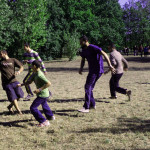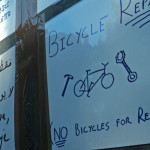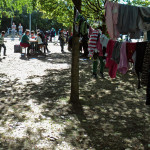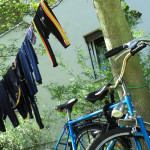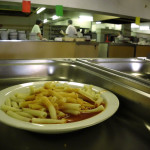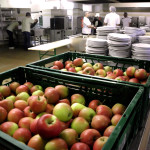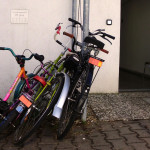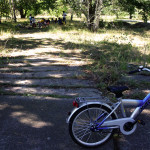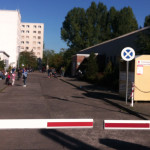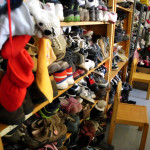
To be a refugee in Germany
The clothing was not as dirty or old or tattered as one might imagine. If only they didn’t have fear in their eyes, if they didn’t eat so stealthily, if they didn’t clutch their few belongings so tightly, the dozens of people who stepped down from the 9 o’clock train at the Hamburg rail station might have seemed “normal.”
The luminous vests could be seen from afar, vests worn by 20-some-year-old volunteers who distributed water, blankets, some frugal snacks, called out for an Arab interpreter, offered overnight lodging holding posters written in several languages. Ten yards away, everything went on as usual. It was night and the cold was intense.
Most of those who provided help went to the station because of pleas published online. Support groups have created spaces to organize themselves. Two groups in Berlin — Refugees Welcome and Karlshorst Aid — are good examples.
Those spaces were created spontaneously when an emergency center was opened in the Berlin district of Karlshorst to deal with refugees who had gathered for weeks outside the Health and Services Department (Lageso, in German shorthand) waiting — in the open, without food or water — for the authorities to recognize their obvious status.
To reach Berlin — alive and in one piece — was an odyssey for the refugees, but to find an acceptable place to live in another country can be even tougher. The end does not always compensate the means.
So far, it has been the citizens who have dealt with the refugee phenomenon and, although the human act of aiding a fellow human is not enough, the more than 2,000 volunteers who work alongside the German Red Cross in Karlshorst are accomplishing more than the government is doing.
Is my house your home?
When Mohammed — a 25-year-old Iraqi — was in Tokyo, he met the German girl who would later become his wife. They married in Japan and have been living in Berlin for the past two months. In the morning, he goes to school to learn German because, so long as he does not receive a certificate that confirms his knowledge, he cannot look for a job.
In his spare time, he works as a volunteer interpreter at the Karlshorst welcome center. It is difficult to think in Arabic, English and German, he says, while translating the story of a man who lost his wife on the way from Turkey to Greece. The center managed to contact her through WhatsApp.
Now living in Karlshorst are almost 1,000 people from 21 countries, mostly from Syria, Iraq and Afghanistan. One third is women, 10 of them pregnant. About 300 are boys under 18, of whom 70 are under 3, according to Rüdiger Kunz, official spokesman for the German Red Cross in the district.
At the center, the refugees get a bed, clothing and three meals a day. Compared with the imminent danger of death, this situation is glorious. Because most of the refugees are Muslim, the kitchen does not prepare dishes containing pork.
German classes are given to men and women in separate rooms, because mixing the sexes might unsettle the students’ spouses. Several guards cover the entrance and the surrounding areas.
“It can be said that the refugees are more or less welcome, because there were no aggressive reactions,” says Kunz. “The appearance of neo-Nazi movements has to do with adverse economic and social conditions. That is not the case here because this is an affluent neighborhood, but it has happened elsewhere because the situation there has been more difficult.”
All public signs are in four languages, even the image signs, which everyone understands. It is a strange kind of Babel, where smiling and gesturing are helpful. Most of the refugees do not understand German and very few volunteers speak the languages of the Middle East; therefore, it is hard to explain the legal procedures and the status of immigrants under temporary shelter.
“Hey, how are you?” says Bernd Pickert, a volunteer and journalist for the newspaper Taz. He is German and knows that communication is a priority for the refugees, in case they can obtain a residence permit.
“In Germany, every minor has to go to school. It is not only a right but also a duty,” he says. “Near the center of town there are some elementary schools but they have no room for the more than 200 minors who haven’t gone to school so far. Besides, those families don’t know whether they can remain in Berlin or not.”
To enroll in school, a medical checkup is necessary. Sometimes it cannot be done because of bureaucracy; sometimes because of the government of Berlin’s unwillingness to allow the Red Cross to perform such examinations.
Although this is an emergency center, there is no round-the-clock physician. “If one is needed, we summon him,” says the Red Cross spokesman. Even so, more than 100 doctors have volunteered to serve in shifts. According to the Spanish newspaper El Diario, one of them is paid for treating emergency cases.
Along with other volunteers, Pickert created a small shop where bicycles are repaired and assembled with donated parts. His teenage sons help him. There aren’t enough bicycles for everyone but any refugee who has one defends it with his life; it means freedom to move about, to control something in a new life.
“They are not prisoners; they can leave whenever they want to,” Pickert says.
From time to time, the refugees play pétanque with their neighbors. A few weeks ago, the Berlin Youth Symphony Orchestra played for them. Now they’re thinking about creating a soccer field. Those initiatives transcend “the basics” and give them certain stability; they while away the time of those who get up every morning and can’t study or work.
There are occasional clashes. “It is normal that conflictive situations arise,” says Pickert. “These are people who live in a restricted space, come from different cultures, have little to do, and carry with them all the trauma of war. However, in comparison with other refugee centers, the situation here is a lot more peaceful.”
Red Cross spokesman Kunz says that the basic rules of coexistence are enforced. For example, no firearms are permitted. And when the rules are broken, the resident is expelled, as has happened twice.
“It is necessary to be firm in this respect because the everyone’s security is at stake,” he says.
A few nights ago, a family from Iraq (a man, his wife and three teenage children) arrived at the center but were told that there was no space available. Only one day earlier, 80 people had arrived, the Iraqis were told. Visibly angry, the man and his family left.
Alexandra Giurdanella, one of the more caring volunteers, bewailed her inability to keep the family from leaving. Other refugees saw how upset she was and, after she told them what had happened, they went looking for beds until they found the five required. They themselves went off and found the family.
The following morning, the father explained to Alexandra that, while the family had been at Lageso, he had struck his wife and that was the reason why he didn’t want to return there. He apologized for his display of anger and thanked the volunteer for her concern.
“These little stories are not part of the great tale that’s being written here every day, but they always remind us that we’re not dealing with numbers but with human beings,” Pickert explains.
Looking for the missing
“Attention, I have no driver’s license for my baby car,” reads the donated sweater worn by the 4-year-old Muhammad. He runs around, rides his bicycle, laughs. Nobody would think that he’s an uprooted child. Fortunately, his father confirmed via WhatsApp that the boy’s mother, though far away in Turkey, is still alive.
The posters with photographs of people sought by refugees reflect that separation.
“I’m looking for my …” daughter, father, nephew, grandmother, husband, and a long etcetera. By this means, four families have been reunited. And the basic aid exists, though it’s not sufficient.
“What needs to be solved at once is so great that we haven’t had time to think about tomorrow,” Pickert says.
One of the sore points of the debate ongoing here is the sustainability of the material support (funding) for the refugees, and the consequences that the massive arrival of migrants will have on Germany, a country whose society is sensitive to the rejection of ethnic and minority groups.
Der Spiegel Online, a giant of the German press, has removed the “Comments” feature from all its articles dealing with the refugee problem, a symptom of the existing controversy.
Some countries (Croatia, Austria, Hungary) have closed their borders to the refugees and this has had an impact on Germany. The map continues to change, leaving fewer possibilities to the refugees and encouraging the traffic in humans.
“A boat that normally seats 10 persons is filled with 50 who have paid large sums to come aboard. The captain starts the engine and escapes halfway through the voyage. That’s criminal and irresponsible,” says Pickert.
“But that’s the only way that they can come here. So, what’s the European Union complaining about? That’s the system that we ourselves established.”
That’s easy to understand from this side of the Atlantic. The United States adopts a similar strategy about Cuba: it promotes illegal emigration instead of issuing visas.
Who will bell the cat now? More than 5,000 refugees arrived in Berlin in just one week. It’s hard to imagine that the volunteers will spend years doing the work of the authorities. And the people who arrive have the right to find a better way of living.
That’s why it’s hard to find an ideal solution at this point in the conflict, no matter what the causes and the responsible people are. At least, no one seems to have a solution.
“At this moment, nobody has an easy time. Almost all the cities in Syria are destroyed. Even if the war ended today, it will take years before the people can return and live there again,” said Pickert in an interview with Radio Berlin-Brandenburg.
Right now, the Red Cross is providing counsel for the more than 120 volunteers in Karlshorst because those people are in direct contact with some very harsh life stories and often are emotionally affected. The volunteers must distance themselves from those realities; if they become too involved, they cannot act in an effective manner.
The volunteers and members of the Red Cross are dealing with the consequences of a conflict that will not end in the near future. The aid the refugees have received has been insufficient. The causes of the problem remain intact.
(Journalists Eileen Sosin Martínez and Rachel D. Rojas, along with Prof. Fidel Alejandro Rodríguez of the School of Communications of the University of Havana, visited the reception center at Kalshorst as part of a journalism workshop in Berlin to which they were invited by the Panter Foundation and the newspaper Taz, Sept. 10-20.)
Photos: Fidel Alejandro Rodríguez


